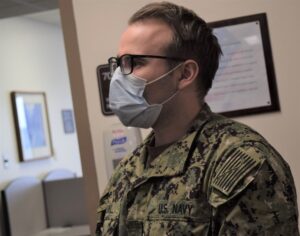
Story by Douglas Stutz
Naval Hospital Bremerton/Navy Medicine Readiness and Training Command Bremerton
When Hospital Corpsman 3rd Class Gunnar Haskill was asked to sum up his Navy Medicine career in one word, he replied, “Fulfilling.”
Haskill is a behavioral health technician assigned to Navy Medicine Readiness Training Command Bremerton. He assists psychologists and psychiatrists by performing assessments, handling crisis triages, and facilitating interactive groups. He also provides short-term counseling, helps with operational stress control and does psychological testing.
“Here at the Mental Health Clinic, we do everything from seeing patients to front desk work. There is always something to do,” said Haskill, from Visalia, California. The Redwood High School 2017 graduate with a College of the Sequoias associate of arts degree from 2019 is also on track to receive a bachelor’s degree in business management from Grand Canyon University in September.
With May designated as Mental Health Awareness Month by the Department of Defense, Haskill and other BHTs provide vital medical specialty care, as well as help others to understand the importance of mental health.
“I want everyone to know that here at Mental Health Clinic we are here for them,” Haskill said. “It is not shameful to seek out mental health. It is the bravest thing to do in our eyes.”
NMRTC Bremerton’s Mental Health department offers a wide array of outpatient behavioral health services such as individual psychotherapy, operational and readiness-related psychological evaluations, and Personnel Reliability Program personnel evaluations to Sailors, Marines and Coast Guard across 299 tenet commands in the Pacific Northwest and as far afield as Naval Air Station Lemoore. Just for the last year, Haskill and other behavioral health technicians handled a high level of clinical involvement, including providing 198 safety checks, 1,092 access-to-care appointments, and 130 group therapy sessions as well as individual patient follow-up care.
“I think the department here as a whole has been great at helping remove barriers of mental health by simply raising awareness and giving useful tools they could use,” said Haskill.
The BHTs in Mental Health’s Substance Abuse Rehabilitation Program also engaged in clinical logistics support, with receipt and review of 307 Drug and Alcohol Program Advisor packages on behalf of service members from commands throughout the Pacific Northwest region, scheduling 318 screening appointments for those engaged with their command DAPA as self-referrals or command referrals, and coordinating appropriate level of care needs for 318 patients within the clinic or by way of clinical placement through case management.
“Behavioral health technicians are needed because there has been an increase in uniform members seeking out mental health,” said Haskill. “It is something that we are very happy about as people are finally breaking the stigma of mental health.”
Military leaders acknowledge that the aforementioned stigma is still in place for some to even consider seeking mental health. Haskill helps refute that notion by affirming that anyone can seek resources for treatment and support without fear of judgment or impact to their career or security clearance eligibility.
One such readily available resource at NMRTC Bremerton is ‘Mental Health Office Hours,’ for active duty service members to drop-in any Thursday between 8 a.m. and 9:30 a.m. for questions, consultations, connection to care, support, resources and information needs.
“The hardest thing is taking that first step,” noted Haskill, who took his own initial stride in 2019 to join the Navy.
“My Navy Medicine career began when I found out what a hospital corpsman was. I was working as an emergency medical technician in college and heard about the versatility of a corpsman and was sold. I was interested in Navy Medicine mainly to help those who needed help,” related Haskill, readily acknowledging that service before self is a familial trait.
“I am from a family of service. My father was a cop and special agent for the Department of Justice. My mother was a trauma and burn nurse. Seeing how they have helped people made me want to join. Both my brother and I joined the service out of junior college. He was in the U.S. Coast Guard and did the law enforcement side while I joined to get on the medical side. We also have a younger sister who just completed her first year of law school at University of San Diego. I also have a wife who is my biggest supporter in everything I do,” stated Haskill.
In his relatively short tenure, Navy Medicine has taken Haskill to a number of locales within the U.S. and to the far side of the Pacific on Guam, Japan and transiting the South China Sea.
“Corpsmen are very versatile. Knowing how to treat someone physically and mentally is very important. It allows us to assess someone as whole instead of just an injury,” reflected Haskill, adding that the best part of his career to date has been deploying onboard USS Carl Vinson (CVN 70) from August 2021 to February 2022. “I met a lot of lifelong friends and got to be a corpsman on both sides, responding to emergencies and doing mental health.”
There have been trials along the way, but they’ve been mitigated with heartwarming instances.
“The most challenging aspect of my position is knowing how you are going to approach a patient. Knowing how to ask the questions needed and getting in the flow makes it a lot easier. It just takes time and practice,” explained Haskill. “The most gratifying aspect of being a behavioral health technician is seeing someone get better. Seeing people when they are the lowest of lows is never fun. But seeing them progressively get better makes this job well worth it.”
“It takes a lot to be a behavioral health technician but is well worth it. Being a corpsman with these skills are great,” added Haskill.